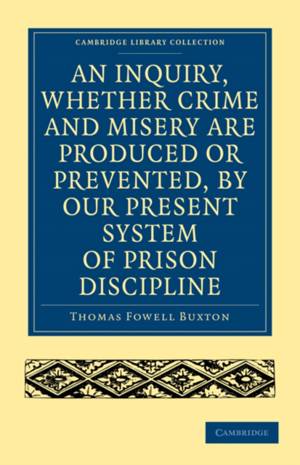
Je cadeautjes zeker op tijd in huis hebben voor de feestdagen? Kom langs in onze winkels en vind het perfecte geschenk!
- Afhalen na 1 uur in een winkel met voorraad
- Gratis thuislevering in België vanaf € 30
- Ruim aanbod met 7 miljoen producten
Je cadeautjes zeker op tijd in huis hebben voor de feestdagen? Kom langs in onze winkels en vind het perfecte geschenk!
- Afhalen na 1 uur in een winkel met voorraad
- Gratis thuislevering in België vanaf € 30
- Ruim aanbod met 7 miljoen producten
Zoeken
An Inquiry, Whether Crime and Misery Are Produced or Prevented, by Our Present System of Prison Discipline
Thomas Fowell Buxton
€ 26,95
+ 53 punten
Omschrijving
Thomas Fowell Buxton, M. P. (1786-1845) was a philanthropist who had many connections with the Quaker movement through the family of his wife, who was the sister of Henry Gurney and Elizabeth Fry. He was a passionate opponent of slavery, and campaigned to end it at a time when most British people believed that enough had been done by the abolition of slave trading in 1807. His other great interest was the punishment of crime: he wanted the death sentence abolished, and his campaign succeeded in reducing the number of capital crimes from over two hundred to eight. This book is a plea for a complete change in the purpose and operation of prisons, and an argument (still valid today) that prisons actually encourage crime and produce recidivists rather than reformed characters. Buxton draws on own his experience as a visitor to produce a harrowing account of Victorian prison conditions.
Specificaties
Betrokkenen
- Auteur(s):
- Uitgeverij:
Inhoud
- Aantal bladzijden:
- 156
- Taal:
- Engels
- Reeks:
Eigenschappen
- Productcode (EAN):
- 9781108004923
- Verschijningsdatum:
- 20/07/2009
- Uitvoering:
- Paperback
- Formaat:
- Trade paperback (VS)
- Afmetingen:
- 140 mm x 216 mm
- Gewicht:
- 204 g

Alleen bij Standaard Boekhandel
+ 53 punten op je klantenkaart van Standaard Boekhandel
Beoordelingen
We publiceren alleen reviews die voldoen aan de voorwaarden voor reviews. Bekijk onze voorwaarden voor reviews.









